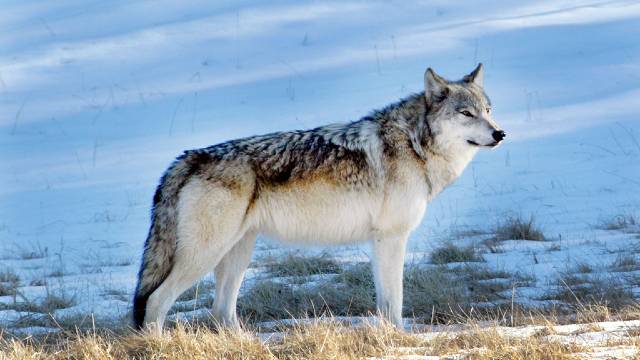An order Thursday from a federal court in California returns gray wolves, including those in Michigan, to the federal list of endangered species. The ruling means that two state laws governing the ability to kill wolves preying on livestock, pets and hunting dogs have been immediately suspended.
The ruling from U.S. District Judge Jeffrey S. White in the Northern District of California vacated a U.S. Fish and Wildlife Service order from Nov. 3, 2020, which removed gray wolves from the List of Endangered and Threatened Wildlife in the lower 48 states, beginning Jan. 4, 2021. That original U.S. Fish and Wildlife Service ruling did not include wolves in the northern Rockies, nor the Mexican wolf subspecies.
“The changes on wolf protections took effect immediately Thursday with the judge’s signing of the U.S. District Court order,” said Michigan Department of Natural Resources Public Information Officer Ed Golder. “Ongoing work to update the 2015 Michigan Wolf Management Plan will continue, with completion of that process expected later this year.”
The now-suspended state laws are Public Act 318 of 2008, which allows hunting dog owners to remove, capture or use lethal means to destroy a wolf in the act of preying on the owner’s dog, and Public Act 290 of 2008, which offers the same provisions to livestock owners.
Wolves in Michigan are classified as a protected game species. It remains illegal to kill a wolf, except in defense of human life. Livestock owners will continue to be compensated for wolf depredation losses. Hunting of wolves while they are on the endangered species list is not permitted.
The DNR had supported the federal rule to delist wolves because the state’s wolf population has long surpassed federal and state goals for recovery.
The restoration of wolf protections comes as many wolf-hunt proponents have been advocating for a hunt across the Upper Peninsula. Decisions to implement and regulate hunts of state game animals reside with the Michigan Natural Resources Commission.
The DNR had said that before a wolf hunt should be considered, several things should take place, including updating the Michigan Wolf Management Plan, consulting with Native American tribes and that the legal status of wolves should be more permanently settled given a long history of legal challenges to delisting decisions resulting in a frequently shifting status of wolves.
The DNR had begun work to update the wolf management plan in 2021 and had met with tribal governments as the federal court challenges continued.
The court’s order resolved cross motions for summary judgment in three related cases.
Plaintiffs included Defenders of Wildlife, WildEarth Guardians and the Natural Resources Defense Council, Inc., while the defendants included the U.S. Department of the Interior and its Fish and Wildlife Service. Intervenor defendants included the state of Utah, National Rifle Association of America and Safari Club International.












